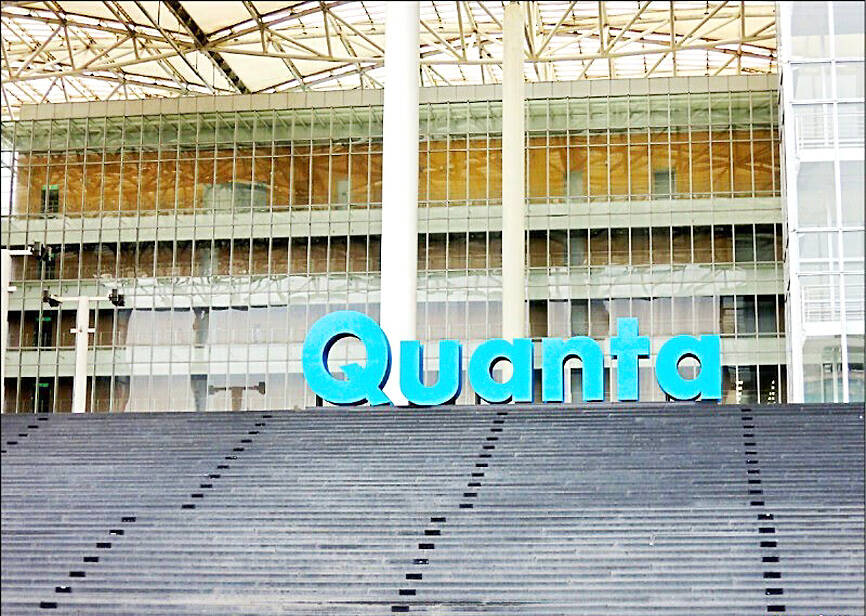Quanta Computer Inc’s (廣達電腦) board of directors has approved a plan to invest US$50 million in a new Vietnamese subsidiary, the company said yesterday, as the computer and server maker continues to diversify its production bases to meet customer demand for improved supply chain resiliency.
Quanta, a major assembler of Apple Inc’s MacBook computers, plans to produce notebook computers and some consumer electronics at the new Vietnamese facility, its second manufacturing hub in Southeast Asia after Thailand, it said.
“The company has been evaluating production diversification outside China since 2018 due to US-China trade disputes,” a Quanta official said in a telephone interview yesterday. “Customers are growing keen on our production allocation due to the effects of COVID-19 and geopolitical tensions.”

Photo: Vanessa Cho, Taipei Times
Vietnam has an abundant, affordable labor supply and benefits from an industrial cluster effect, the official said.
“However, China remains the company’s biggest notebook computer manufacturing site. Quanta assembles notebook computers primarily at its Shanghai and Chongqing factories currently,” they said.
Quanta’s move follows other Taiwanese electronics makers, including Compal Electronics Inc (仁寶), Wistron Corp (緯創), Pegatron Corp (和碩) and Inventec Corp (英業達), in increasing investment in Vietnam in the past few years.
Quanta has allocated manufacturing of low-cost consumer electronics and some servers to its Thailand factory, to avoid paying import tariffs implemented by the US and Europe due to a US-China trade row.
Taiwan has become the company’s major production site for servers, it said.
Quanta last week reported that first-quarter revenue contracted 18.39 percent quarter-on-quarter, down 11.8 percent year-on-year, to NT$266.18 billion (US$8.73 billion).
The company expects notebook computer shipments to return to growth this quarter, after slumping 36 percent annually to 10.8 million units last quarter.
Quanta’s net profit last year fell 14 percent to NT$28.96 billion, from NT$33.65 billion in 2021, with earnings per share dropping from NT$8.73 to NT$7.51.
Gross margin fell to 5.54 percent from 6.38 percent a year earlier.
The company plans to distribute a cash dividend of NT$6 per share to shareholders this year, representing a payout ratio of about 80 percent.

Semiconductor business between Taiwan and the US is a “win-win” model for both sides given the high level of complementarity, the government said yesterday responding to tariff threats from US President Donald Trump. Home to the world’s largest contract chipmaker, Taiwan Semiconductor Manufacturing Co (TSMC, 台積電), Taiwan is a key link in the global technology supply chain for companies such as Apple Inc and Nvidia Corp. Trump said on Monday he plans to impose tariffs on imported chips, pharmaceuticals and steel in an effort to get the producers to make them in the US. “Taiwan and the US semiconductor and other technology industries

SMALL AND EFFICIENT: The Chinese AI app’s initial success has spurred worries in the US that its tech giants’ massive AI spending needs re-evaluation, a market strategist said Chinese artificial intelligence (AI) start-up DeepSeek’s (深度求索) eponymous AI assistant rocketed to the top of Apple Inc’s iPhone download charts, stirring doubts in Silicon Valley about the strength of the US’ technological dominance. The app’s underlying AI model is widely seen as competitive with OpenAI and Meta Platforms Inc’s latest. Its claim that it cost much less to train and develop triggered share moves across Asia’s supply chain. Chinese tech firms linked to DeepSeek, such as Iflytek Co (科大訊飛), surged yesterday, while chipmaking tool makers like Advantest Corp slumped on the potential threat to demand for Nvidia Corp’s AI accelerators. US stock

The US Federal Reserve is expected to announce a pause in rate cuts on Wednesday, as policymakers look to continue tackling inflation under close and vocal scrutiny from US President Donald Trump. The Fed cut its key lending rate by a full percentage point in the final four months of last year and indicated it would move more cautiously going forward amid an uptick in inflation away from its long-term target of 2 percent. “I think they will do nothing, and I think they should do nothing,” Federal Reserve Bank of St Louis former president Jim Bullard said. “I think the

‘LASER-FOCUSED’: Trump pledged tariffs on specific sectors, including semiconductors, pharmaceuticals, steel, copper and aluminum, and perhaps even cars US President Donald Trump said he wants to enact across-the-board tariffs that are “much bigger” than 2.5 percent, the latest in a string of signals that he is preparing widespread levies to reshape US supply chains. “I have it in my mind what it’s going to be but I won’t be setting it yet, but it’ll be enough to protect our country,” Trump told reporters on Monday night. Asked about a report that incoming US Secretary of the Treasury Scott Bessent favored starting with a global rate of 2.5 percent, Trump said he did not think Bessent supported that and would not